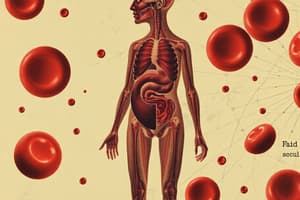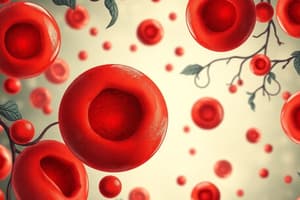Podcast
Questions and Answers
What is the primary function of hemoglobin in erythrocytes?
What is the primary function of hemoglobin in erythrocytes?
- To regulate blood pH levels
- To facilitate the transport of respiratory gases (correct)
- To transport nutrients and waste
- To provide structural support to the cell
What characteristic of erythrocytes contributes to their red color?
What characteristic of erythrocytes contributes to their red color?
- The iron-containing hemoglobin (correct)
- The biconcave shape
- The lack of a nucleus
- The presence of chlorophyll
Where are erythrocytes primarily produced in adults?
Where are erythrocytes primarily produced in adults?
- Spleen
- Lymph nodes
- Red bone marrow (correct)
- Liver
What is the average lifespan of an erythrocyte?
What is the average lifespan of an erythrocyte?
What happens to erythrocytes after their lifespan ends?
What happens to erythrocytes after their lifespan ends?
Flashcards are hidden until you start studying
Study Notes
Erythrocytes: Red Blood Cells
- Most numerous cells in blood
- Healthy adult males typically have 5 to 5.5 million RBCs per cubic millimeter of blood
- Produced in bone marrow
- Lack a nucleus in most mammals
- Biconcave shape
- Contain hemoglobin, an iron-containing protein that gives them their red color
- Hemoglobin is essential for transporting respiratory gases
- Healthy individuals have 12-16 grams of hemoglobin per 100 milliliters of blood
- Average lifespan of 120 days
- Destroyed in the spleen
Studying That Suits You
Use AI to generate personalized quizzes and flashcards to suit your learning preferences.



